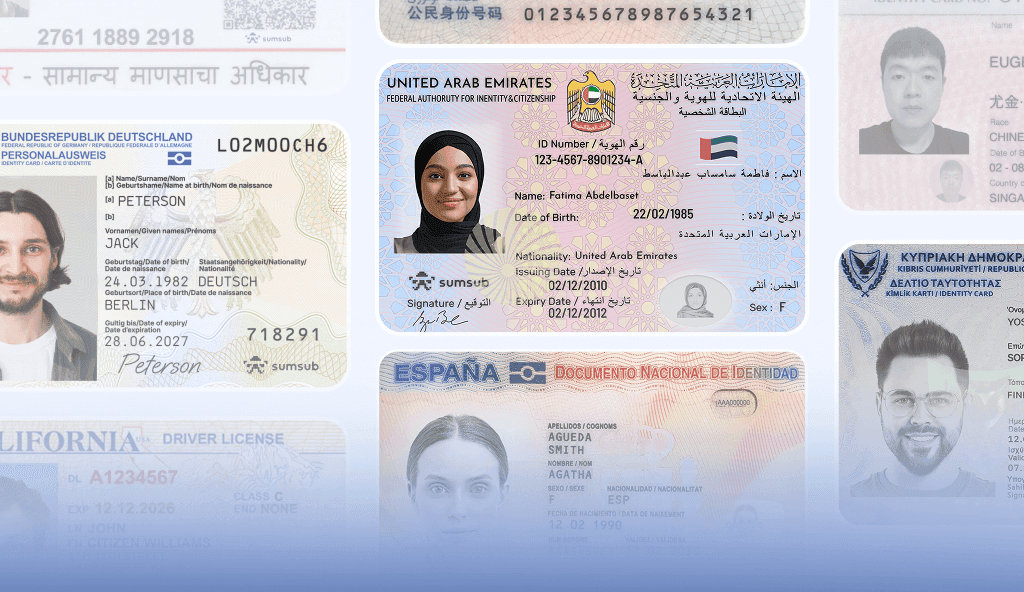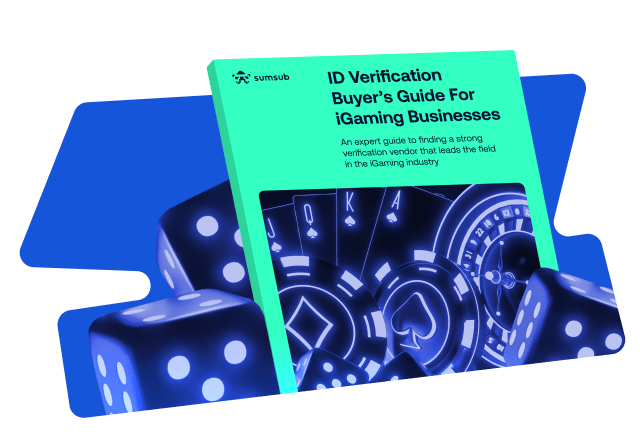- May 19, 2025
- 8 min read
KYC for Gambling: What It Is and Why It’s Crucial (2025 Guide)
Learn why KYC is a must for all gambling businesses.
In 2025, the online gambling market continues to grow steadily in both size and user base. In fact, it is predicted to reach USD 153.57 billion by 2030. However, this expansion inevitably attracts bad actors, including fraudsters and money launderers. And in 2025, money launderers aren’t selective—they exploit every available channel, with gambling being their preferred avenue.
When a platform is used for money laundering and AML safeguards fail, the consequences for the business are severe: reputational damage, eroded customer trust, risk of license revocation, and huge AML fines.
Global fines in the gambling industry totaled $184.4 million in 2024 alone, and regulators remain highly vigilant this year.
For example, in 2025, the gaming regulator in Lithuania fined Olympic Casino Group Baltija €8.4 million ($9.2 million) for failing to prevent a former fund manager at private equity firm BaltCap from gambling millions in stolen funds.
That’s why all gambling operators should prioritize using a reliable KYC solution. An even stronger play is to adopt a full-cycle verification solution that would safeguard them from gambling-related fraud, prevent regulatory fines, and protect against financial losses and reputational damage.
This article examines KYC in the gambling industry, “No KYC casinos,” client retention techniques, and more. It also covers why KYC is crucial for all gambling platforms and how to build a proper flow.
Know Your Customer in casinos and why it’s needed
Know Your Customer (KYC) is a process that financial institutions and other regulated entities (including gambling operators) use to verify the identities of their customers and assess the potential risks associated with them before entering into a business relationship. The KYC process helps prevent identity theft, fraud, money laundering, terrorist financing, and other illicit activities.
Suggested read: A Global Guide to AML Compliance in Gambling, Gaming, and Betting (2024)
KYC is crucial for the gambling industry for several reasons:
- Regulatory compliance. Many jurisdictions have strict regulations in place to prevent activities like money laundering, fraud, and underage gambling. Implementing KYC procedures helps gambling operators comply with these regulations and maintain legal and ethical operations.
- Fraud prevention. KYC helps prevent fraud by ensuring that the individuals participating in gambling activities are who they say they are. This includes verifying the accuracy of personal information provided, such as full legal name, address of residence, valid payment details, and source of funds.
Suggested read: iGaming Affiliate Fraud and How to Prevent it—Complete Guide
- Prevention of money laundering (ML) and terrorism financing (TF). Verifying customers' financial details through the KYC procedure helps gambling operators ensure that they are not unknowingly facilitating financial crimes, including ML/TF.
- Underage gambling prevention. KYC procedures are essential for verifying the age of users to prevent underage individuals from participating in gambling activities. This is a critical aspect of Social Responsibility practices.
- Responsible Gambling. KYC is an important part of the broader effort to promote responsible gambling. By knowing your customers, gambling operators can identify potential issues related to problem gambling behavior and take appropriate measures to address them. Problem gambling is an especially significant issue in Australia, and authorities there take serious steps to combat it:
Suggested read: What is Responsible Gaming?
- Risk management. KYC also serves as a risk management tool for gambling platforms. It helps them assess the level of risk associated with each customer, which is crucial in identifying and preventing potential issues before they escalate.
- Customer relationship. KYC helps financial institutions and other regulated entities build trust with customers by ensuring the safety and security of their transactions and the overall environment. It strengthens the institution's reputation and demonstrates a commitment to ethical and responsible business practices.
No KYC casinos: Why platforms without KYC expose themselves to huge risks
Many players like the idea of a “no KYC casino” or a "no ID casino". They’re often perceived as “easier to use” and faster to get started with, since the onboarding process is skipped altogether. Some players also enjoy the privacy of not having to provide ID, therefore avoiding personal data leaks and misuse of their data. On the other hand, fraudsters and money launderers can have a field day with “no KYC casinos,” which provide a perfect environment to commit financial crime.
Here are the risks that gambling operators face when they don’t implement KYC:
- Fraud. No KYC makes it easier for criminals to use fake identities or engage in fraudulent activities on the platform.
- Money laundering and/or terrorist financing (ML/TF). Without proper KYC, gambling and gaming platforms risk facilitating ML/TF activities. KYC helps to ensure that sources of funds are legitimate and compliant with AML regulations.
- Underage gambling, problem gambling, and non-compliance with regulations.
- Security threats. “No KYC casinos” may be more susceptible to security threats and hacking attempts. Proper identification procedures help secure user accounts and prevent unauthorized access.
- Reputational damage. Failing to implement KYC measures can lead to loss of trust among users and partners. Adverse media or regulatory violations will harm the operator’s reputation, resulting in a decline in user confidence and partner trust.
Check out this free resource designed to help you choose the right identity verification (IDV) vendor for iGaming!
This guide provides everything you need to make an informed decision: key compliance requirements, red flags to watch out for in poor IDV solutions, essential features for effective KYC processes, and practical advice on switching vendors with minimal disruption.
You'll also gain insights from Sumsub on iGaming KYC, along with other important information to assist in your selection process.
No fluff—just the facts from one of the most trusted names in identity verification.
KYC in online casinos: How it works
Casino KYC requirements include a series of identity checks that players must complete before they can start gambling. These include:
- Account registration and provision of basic information
Users create an account on the online casino platform by providing basic information, such as name, date of birth, address, and email.
- Document verification
Users are required to submit official documents to verify their identity. Depending on the jurisdiction, this may include a government-issued ID (such as a passport or driver's license), proof of address (like a utility bill or bank statement), etc. In some cases, Liveness Detection is also needed to confirm a player’s identity.
- Proof of address
Some casinos are also obliged to verify their clients’ addresses depending on the regulations of the jurisdiction they are based in.
- Age verification
Online casinos enforce age restrictions to ensure that only individuals of legal gambling age can participate. Users may need to provide documentation proving they meet the minimum age requirements. Sometimes, Liveness Detection is also required to confirm a player’s identity.
- Payment method verification
Users need to verify their payment methods, which may involve confirming details of credit/debit cards or other financial instruments. This step helps prevent fraud and ensures that funds are deposited and withdrawn securely.
- Source of funds verification
Some online casinos may request the verification of the source of funds for large transactions,or from clients subject to Enhanced Due Diligence (like PEPs), or from individuals from high-risk countries or industries. This is usually needed to comply with AML regulations. All provided documents and identity data should then be thoroughly reviewed by the casino’s compliance team.
- Ongoing monitoring
Casinos should conduct ongoing monitoring of user activity to detect any unusual or suspicious behavior. This helps in identifying potential issues related to problem gambling or fraudulent activities. In case a red flag is identified, gambling operators are obliged to file a suspicious activity report to their local Financial Intelligence Unit (FIU).
Suggested read: Fraud Detection and Prevention—Best Practices for 2025
How to retain “no KYC clients” while still conducting KYC
Apart from educating customers on why the KYC process is extremely important, gambling platforms are recommended to build the most user-friendly flow possible. Here’s how:
- Simplify the process. Design a straightforward KYC process with minimal steps and easy-to-understand instructions. If permissible in your operating jurisdictions, consider non-document verification options, such as Sumsub’s Non-Doc. Another option is Sumsub ID. Sumsub ID eliminates redundant document uploads and streamlines KYC by enabling users to create a secure digital identity profile that stores verified documents and data for faster onboarding.
- Guarantee security and privacy. Emphasize to your users about the privacy and security of their personal information during the KYC process.
- Build a user-friendly interface. If document uploads are needed, create an intuitive and user-friendly interface for submission, making the process simple for new users or those unfamiliar with such procedures. Also, ensure that the KYC user flow is compatible with mobile and tablet devices.
- Add progress tracking. Implement a progress tracking feature so that users can monitor their KYC verification steps and see their status in the process.
- Offer educational resources. Additionally, you can create FAQs or video tutorials to guide users through the KYC process.
- Ensure user support. Offer responsive customer support to assist users with any issues or queries related to the KYC process.
The steps above will ensure a smooth and enjoyable KYC process for clients who are hesitant to undergo KYC, while maintaining high pass rates for gambling platforms.
Global regulations related to KYC in gambling
KYC requirements for gambling platforms have tightened significantly in recent years and continue to grow more stringent. This trend is driven by rising fraud and money laundering risks, evolving global AML standards, regional regulatory developments, and the integration of advanced verification technologies. The direction is clear: gambling operators must prepare for increasingly rigorous and technology-driven KYC compliance.
Several key regulatory initiatives are shaping the current KYC landscape in the gambling sector:
FATF Recommendations
The Financial Action Task Force (FATF) sets international standards for anti-money laundering (AML) and countering the financing of terrorism (CFT). These guidelines directly impact gambling operators worldwide, requiring robust customer due diligence (CDD), ongoing monitoring, and enhanced due diligence (EDD) for high-risk customers.
European Union AML Directives
The EU’s 5th and 6th Anti-Money Laundering Directives (AMLD) impose strict KYC and AML obligations on gambling operators within member states. These obligations include mandatory identity verification, continuous monitoring, and EDD for high-risk individuals, all aimed at preventing financial crimes.
UK Gambling Commission (UKGC) regulations
The UKGC enforces some of the most comprehensive KYC standards in the world. Operators are required to verify players’ identity, age, and address before granting access to gambling services. They must also conduct ongoing monitoring for suspicious behavior. The UK’s recent White Paper proposes even more stringent financial risk checks and affordability assessments.
Brazil regulations
Brazil’s gambling sector underwent a major transformation with the implementation of comprehensive regulations effective January 1, 2025. The key regulation is Law 14.790/2023, which governs online betting and casino activities, introducing strict requirements for both operators and players. Brazil’s 2025 gambling regulation is now considered one of the most robust frameworks globally.
Check out the peculiarities of Brazil gambling and betting regulations in this guide: Brazil Gambling Laws and Regulations: What to Expect in 2025?
US Bank Secrecy Act (BSA) and FinCEN regulations
In the US, the BSA classifies casinos as financial institutions, mandating KYC programs, currency transaction reports (CTRs) for transactions exceeding $10,000, and the reporting of suspicious activities. Additional requirements vary at the state level, adding complexity to compliance efforts.
Suggested read: AML Laws and Regulations in the US
It’s important to note that global regulations are not static. As the regulatory environment continues to evolve, gambling operators must stay vigilant, closely monitor changes, and adapt their KYC programs to remain compliant.
Tips on how to stay compliant
Staying AML-compliant is crucial for online casinos to operate legally and responsibly. Here are some tips to help online casinos maintain AML compliance:
- Implement an Anti-Money Laundering Policy. An AML policy includes measures to stop criminals from disguising illegally obtained money as legitimate income.
Suggested read: Anti-Money Laundering (AML) Policy: Step-by-Step Guide (with Template)
- Appoint a Money Laundering Reporting Officer (MLRO). Gambling operators need to nominate an MLRO responsible for ensuring the protection of internal systems and controls against money laundering. This includes receiving disclosures regarding suspicious activity and deciding whether to file external FIU reports (SARs or STRs).
- Implement KYC procedures. Establish robust Know Your Customer procedures to verify the identity of users during the registration process. This includes verifying their identity, age, and source of funds.
- Implement transaction monitoring. Implement automated systems for transaction monitoring to detect and analyze patterns of suspicious transactions. Unusual or large transactions are an ML red flag and should be properly checked.
- Implement ongoing monitoring. According to Sumsub’s internal statistics, most fraud cases occur after the KYC stage, so it's important for casinos to conduct ongoing monitoring of user activity to detect any unusual or suspicious behavior.
- Conduct regular audits and assessments. Conduct these procedures to ensure that AML policies and procedures are effective and up to date. It helps identify areas that may need improvement.
- Collaborate with regulatory authorities. Stay informed about AML regulations in the jurisdictions where your online casino operates. Keep in touch with regulatory authorities to ensure compliance with local laws.
- Educate and communicate with customers. Clearly communicate AML policies to customers, explaining the necessity of the KYC process. Inform clients about the casino verification process and how to complete all the steps.
- Train staff. Train staff to enable them to detect and identify transactional and/or behavioral abnormalities that may raise suspicion of money laundering.
The best solution for gambling and gaming operators to stay compliant, reduce fraud risks, and ensure a flawless reputation would be to use Sumsub’s full-cycle verification and fraud prevention solution for iGaming.
Sumsub’s full-cycle verification and fraud prevention solution allows you to:
- Securely onboard new players from over 220 countries and territories in less than 30 seconds
- Utilize Non-Doc Verification in jurisdictions where it is allowed
- Set red flags rules to identify vulnerable players and ensure Responsible Gaming compliance
- Verify proof of identity and proof of address in any language in under a minute
- Onboard age-verified gamers only
Sumsub also prevents all gambling-specific fraud in real-time, including:
FAQ
-
What is KYC in gambling?
KYC in gambling refers to the measures implemented by platforms to verify and authenticate the identity, age, and financial information of their users. By verifying the identity of customers, KYC can prevent fraud and money laundering, reducing the risk of activities like identity theft and suspicious transactions. Additionally, KYC facilitates Responsible Gambling by allowing operators to track customers' gambling behavior, identify potential problem gamblers, and implement measures such as setting deposit limits or offering self-exclusion options.
-
What is the KYC policy for online casinos?
The KYC policy for online casinos may vary depending on the jurisdiction, but usually involves procedures to verify the identity, age, and financial details of users. This includes steps such as document verification, age verification, and ongoing monitoring of user activity. The aim is to ensure regulatory compliance, prevent fraud, and maintain a secure and responsible gambling environment.
-
When should a casino file a SAR?
A casino should file a Suspicious Activity Report (SAR) when it identifies transactions or activities that appear suspicious, potentially indicating money laundering or fraud. In some instances, the appointed Compliance Officer must submit a report explaining the reason they think the activity was not suspicious or vice versa. It’s also important to record this assessment as part of the internal procedure.
Relevant articles
- Article
- 1 week ago
- 11 min read
Learn what KYC is and the steps users should take to onboard smoothly.

- Article
- Jan 15, 2026
- 8 min read
AI-generated fake IDs are bypassing traditional KYC: learn why businesses need to rethink their identity verification in 2026.

What is Sumsub anyway?
Not everyone loves compliance—but we do. Sumsub helps businesses verify users, prevent fraud, and meet regulatory requirements anywhere in the world, without compromises. From neobanks to mobility apps, we make sure honest users get in, and bad actors stay out.



